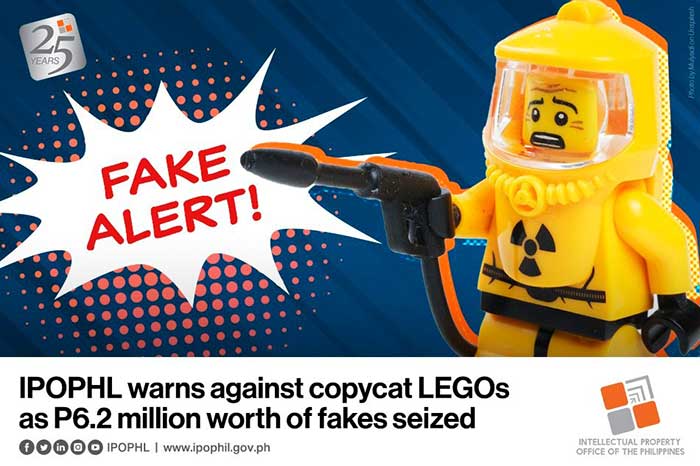
The Intellectual Property Office of the Philippines (IPOPHL) is warning the public against buying copycat LEGO toys following reports and raid operations showing the prevalence of these intellectual property (IP) infringing products in the markets.
Last July, the National Bureau of Investigation’s IP Rights Division (NBI-IPRD) hauled over 2,000 boxes of copycat LEGO products worth about P6.2 million in a mall in Mindanao. The LEGO products bore the copyright protected designs and images of LEGO A/S and marks identical or confusingly similar to the marks of LEGO Juris A/S.
“With the sizable haul of the NBI-IPRD, we urge the public to take heightened caution in buying LEGO products and make sure that they transact only with legitimate LEGO stores and verified accounts on e-commerce platforms,” IP Rights Enforcement Office Officer-in-Charge Ann N. Edillon said.
Edillon, however, acknowledged that there remain to be a handful of willing buyers of cheap, substandard products.
“The low price will always be an attractive selling point to any consumer. But wise consumers, especially parents, should always consider quality, durability and especially the safety of the toys and products their children use,” Edillon said, noting that IPOPHL aggressively warns against the economic and safety risks of patronizing counterfeits as it works closely with the Department of Trade and Industry on consumer education.
“LEGO products are made of materials of the highest quality and we prioritize consumer safety. We want to ensure that parents and children who buy our toys, get a product of impeccable quality that lives up to the strictest safety standards,” Atty. Franklin Galman, the LEGO Group’s IP Rights Corporate Legal Counsel for the APAC region, said.
But infringing products do not follow quality control standards and “are usually manufactured under unsanitary conditions,” according to Galman. Their threats to consumer health compels companies like the LEGO Group to take “a zero-tolerance approach” against infringers.
“We cannot compromise a child’s safety; that’s why we go after copycats and counterfeits… We always respect and welcome fair competition, but when someone disregards our IP rights and abuses our consumers’ trust, we take the necessary steps to protect both our brand and our consumers,” Galman added, noting they are looking into other markets in the country reported to sell more LEGO copycats.
LEGO A/S and LEGO Juris A/S are both part of the Denmark-based LEGO Group. LEGO A/S owns the copyright over thousands of designs and images appearing on LEGO products while LEGO JURIS A/S owns the internationally well-known LEGO marks such as the 3D minifigure, among others.
Earlier this year, IPOPHL met with the LEGO Group to discuss enforcement actions and remedies that could protect the company’s IPs.
“We’re happy to know that Philippine laws take a more aggressive stance against copycats, in addition to the usual counterfeiters,” Galman said.
Unlike counterfeit products that bear the exact logos of marks they imitate, copycats are slightly different in that they copy only a distinctive property of another to pass off their product for that which has established goodwill. Copycats are considered IP infringing goods under the Copyright Infringement and Unfair Competition provisions of the IP Code.
The Danish toy manufacturer is also mulling over the prospects of joining the Memorandum of Understanding (MOU) that IPOPHL helped facilitate between companies and e-commerce platforms to boost proactive and responsive measures against IP violations online.
Currently with 16 contracting members, the e-commerce MOU has effectively led to heightened removals of counterfeit and piracy listings on Shopee and Lazada. (With the assistance of Baranda & Associates)


















